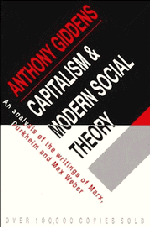Book contents
- Frontmatter
- Contents
- Acknowledgements
- Preface
- Introduction
- List of abbreviations used
- Dedication
- Part 1 Marx
- Part 2 Durkheim
- Part 3 Max Weber
- 9 Max Weber: Protestantism and capitalism
- 10 Weber's methodological essays
- 11 Fundamental concepts of sociology
- 12 Rationalisation, the ‘world religions’, and western capitalism
- Part 4 Capitalism, socialism and social theory
- Postscript: Marx and modern sociology
- Bibliography of works cited in text
- Index
10 - Weber's methodological essays
Published online by Cambridge University Press: 05 August 2013
- Frontmatter
- Contents
- Acknowledgements
- Preface
- Introduction
- List of abbreviations used
- Dedication
- Part 1 Marx
- Part 2 Durkheim
- Part 3 Max Weber
- 9 Max Weber: Protestantism and capitalism
- 10 Weber's methodological essays
- 11 Fundamental concepts of sociology
- 12 Rationalisation, the ‘world religions’, and western capitalism
- Part 4 Capitalism, socialism and social theory
- Postscript: Marx and modern sociology
- Bibliography of works cited in text
- Index
Summary
The Protestant Ethic concludes with a plea for the rejection of both materialistic and idealistic interpretations of history as overall theoretical schemes: ‘each’, Weber says, ‘if it does not serve as the preparation, but as the conclusion of an investigation, accomplishes equally little in the interest of historical truth’. Weber's methodological writings expound this position in considerable depth.
The genealogy of Weber's methodological essays is complex, however, and they must also be placed within the framework of the then current controversy over the relationship between the natural and the ‘human’ or social sciences. Whereas Durkheim was steeped in a tradition of positivism which reached back to well before Comte, no directly comparable tradition existed in German social thought. The lengthy and complicated debate which arose in Germany over the status of the sciences of man thus explored issues which remained largely quiescent in French history and social philosophy. Weber, in common with most of his German contemporaries, bluntly rejects the Comtean notion that the sciences are ordered in the form of an empirical and logical hierarchy, in which each science depends upon the prior historical emergence of the one below it in the hierarchy. In this form of positivist orthodoxy, social science is treated as involving simply the extension of the presuppositions and methods of the natural science to the study of human beings.
- Type
- Chapter
- Information
- Capitalism and Modern Social TheoryAn Analysis of the Writings of Marx, Durkheim and Max Weber, pp. 133 - 144Publisher: Cambridge University PressPrint publication year: 1971
- 1
- Cited by



